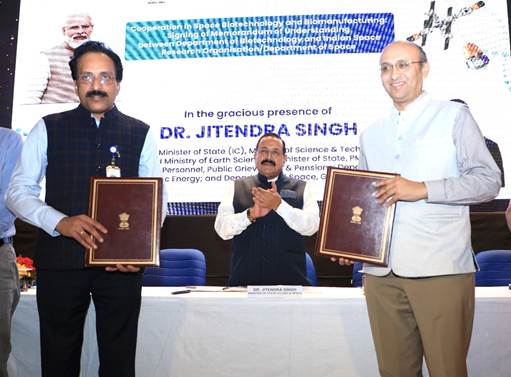India will have its own Space Station by 2035, which will be known as “Bharatiya Antriksh Station”.
This was disclosed here today by Union Minister of State (Independent Charge) for Science and Technology, Minister of State (Independent Charge) for Earth Sciences, MoS PMO, Department of Atomic Energy, Department of Space, Personnel, Public Grievances and Pensions, Dr Jitendra Singh while responding to a query from a media person after he announced the signing of a landmark Memorandum of Understanding (MoU) between the Indian Space Research Organisation (ISRO) and the Department of Biotechnology (DBT).
In a significant development, the MoU marks a unique collaboration aimed to integrate biotechnology with space technology, heralding a new era of scientific innovation in India.

Dr. Jitendra Singh highlighted the transformative journey of biotechnology, which has traditionally been confined to laboratories, now reaching the vast expanse of space. He emphasised that this MoU represents a pivotal step towards practical applications of biotechnology, moving beyond theoretical research.
The Minister praised ISRO Chairman S. Somnath and Secretary of the Department of Biotechnology Dr. Rajesh Gokhale for their efforts in making this collaboration possible. He noted the historical journey of both departments and the visionary leadership that has driven their success.

Dr. Jitendra Singh emphasised on public-private participation, which has been instrumental in the rapid growth of India’s space sector. He credited Prime Minister Narendra Modi for opening up the space sector to private players, leading to a surge in innovation and entrepreneurship. The minister pointed out that the number of space startups has grown significantly, with nearly 300 startups now contributing to the space economy.
Dr. Jitendra Singh also spoke about the rising prominence of biotechnology, particularly in the wake of the COVID-19 pandemic. He acknowledged the Department of Biotechnology’s role in developing the first-ever DNA vaccine, which brought global recognition to India’s scientific capabilities.
The MoU outlines several key initiatives, including the establishment of a Bharatiya Antariksh Station and the unveiling of the BioE3 (Biotechnology for Economy, Environment, and Employment) Policy. This policy aims to foster high-performance biomanufacturing in the country, with a goal of reaching a $300 billion bioeconomy by 2030. The collaboration will focus on areas such as microgravity research, space biotechnology, space biomanufacturing, bioastronautics, and space biology.
This partnership is expected to benefit the national human space programme and spur innovations in human health research, novel pharmaceuticals, regenerative medicine, and bio-based technologies for efficient waste management and recycling. It will also open opportunities for startups in the space and biotechnology sectors to develop commercially attractive technological solutions.
Concluding his address, Dr. Jitendra Singh expressed optimism about the future, envisioning a new era of bio-astronautics and space biology. He highlighted the potential for groundbreaking research and innovation that this collaboration could unlock, benefiting not just India but the world at large.
This historic partnership between ISRO and the Department of Biotechnology is set to pave the way for unprecedented advancements in science and technology, reinforcing India’s position as a global leader in innovation.
The event saw the participation of ISRO Chairman S. Somnath, Secretary of the Department of Biotechnology Dr. Rajesh Gokhale, Dr. Ramesh V. Sonti, Director of ICGEB, Dr. Alka Sharma, Chief Scientist in the Department of Biotechnology, and other senior officers, underscoring the high-level commitment and collaborative spirit driving this landmark partnership.

Comments are closed.